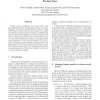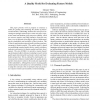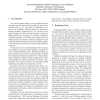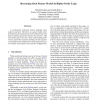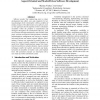133
click to vote
SPLC
2007
15 years 3 months ago
2007
Product lines need decision models that guide the derivation of product variants satisfying specific requirements. In dynamic product lines, whose requirements vary during runtime...
148
click to vote
SPLC
2007
15 years 3 months ago
2007
Systems such as adaptative and context–aware ones must adapt themselves to changing requirements at runtime. Modeling and implementing this kind of systems is a difficult opera...
150
click to vote
SPLC
2007
15 years 3 months ago
2007
This paper presents work in progress to construct a model for guiding and evaluating the quality of featureoriented models, called FMQ. Product line concepts are becoming increasi...
102
click to vote
SPLC
2007
15 years 3 months ago
2007
Taking an extractive approach to decompose a legacy application into features is difficult and laborious with current approaches and tools. We present a prototype of a tooldriven...
SPLC
2007
15 years 3 months ago
2007
113
click to vote
SPLC
2007
15 years 3 months ago
2007
Managing variability is the essence of software product line (PL) practice. With many variant features and complex dependencies among them, it also becomes a major challenge for e...
118
click to vote
SPLC
2007
15 years 3 months ago
2007
A mechanically formalized feature modeling metamodel is presented. This theory is a generic higher-order formalization of a mathematical model synthesizing several feature modelin...
100
click to vote
SPLC
2007
15 years 3 months ago
2007
Abstract—Product-line architectures (PLAs) designed for mobile devices create a unique challenge for automated product variant selection engines since variants must be derived on...
168
click to vote
SPLC
2007
15 years 3 months ago
2007
Software product line engineering aims to reduce development time, effort, cost, and complexity by taking advantage of the commonality within a portfolio of similar products. The ...
116
click to vote
SPLC
2007
15 years 3 months ago
2007
Danfoss Drives - one of the largest producers of frequency converters in the world - is in a situation like many others: it has to produce a number of product series with an incre...

